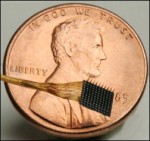Jul 17, 2006
BrainGate
In a study published in the journal Nature this week, researchers from Boston-based Cyberkinetics Neurotechnology Systems describe how two paralyzed patients with a surgically implanted neural device successfully controlled a computer and, in one case, a robotic arm, using only their thoughts.
These findings include the ability to voluntarily generate signals in the dorsal pre-motor cortex, the area of the brain responsible for the planning, selection and execution of movement. While accuracy levels have been previously published, the current study reveals unprecedented speed in retrieving and interpreting the neural signals that can be applied to the operation of external devices that require fast, accurate selections, such as typing.
The brain-computer interface used in the study consists of an internal sensor to detect brain cell activity and external processors that convert these brain signals into a computer-mediated output under the person's own control.

According to John Donoghue, Chief Scientific Officer of Cyberkinetics, and a co-inventor of the BrainGate technology, "The results achieved from this study demonstrate the utility and versatility of Cyberkinetics' neural sensing technology to achieve very rapid, accurate decoding - about as fast as humans ordinarily make decisions to move when asked. The contributions of complementary research with our electrode and data acquisition technology should enhance our development of the BrainGate System in its ability to, one day, enable those with severe paralysis or other neurological conditions to lead more independent lives."
See video here
23:04 Posted in Brain-computer interface | Permalink | Comments (0)







The comments are closed.